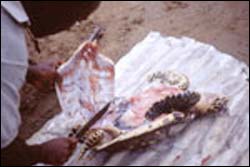SEATURTLE.ORG Announces African Sea Turtle Fund

SEATURTLE.ORG has announced a new fund raiser to support sea turtle research and conservation in Africa. The African Sea Turtle Fund will be a small, competitive grants fund, with initial grants limited to activities along Africa’s Atlantic coast. The goal is to raise $10,000, and one lucky contributor will win a brand new Apple iPod photo.
Six species of sea turtles (loggerheads, leatherbacks, greens, hawksbills, olive ridleys, and Kemp’s ridleys) are found along the Atlantic coast of Africa which stretches from the Straits of Gibralter to the Cape of Good Hope and includes the Spanish territory of Ceuta, Macaronesia and the Gulf of Guinea islands.
Several significant sea turtle nesting, feeding, and developmental habitats of different species have been identified along this coast. Some of these populations are not only of regional importance, but of global importance too. For example the green turtle nesting population in Guinea Bissau, the loggerhead nesting population in Cape Verde which is suspected to be the second largest in the Atlantic, and the leatherback nesting population in Gabon which could potentially be among the largest in the world.
Several serious threats continue to endanger the survival of sea turtles in the region — namely, widespread killing of females for their meat, fat, and carapace, harvest of eggs, accidental captures of all size classes in commercial and artisinal fisheries, habitat destruction, and pollution. Poverty of coastal inhabitants also places great pressure on sea turtle populations and needs to be appropriately addressed in the conservation context.
Sea turtle projects are currently underway in many countries. However, most of these projects lack essential resources for basic data collection, capacity building, environmental awareness programs, community-based programs, and enforcement of existing laws. Sea turtle work in the region is still relatively young and there is a lot of work ahead! Funding is urgently needed to develop and implement management strategies based on the best available biological and socio-economic data before populations are depleted beyond recovery.
Award announcements and the final results of each funded project will be made available to the public through the SEATURTLE.ORG website. The African Sea Turtle Fund is being developed in coordination with SEATURTLE.ORG’s Board of Directors and the West African Sea Turtle Network–Programme Kudu.
Individuals and organizations interested is helping to conserve sea turtles in Africa are encouraged to provide full or partial matching grants or contribute additional prizes for the fund giveaway. There are also opportunities to become a fund sponsor. Members of the public can contribute to the fund on the SEATURTLE.ORG website (http://www.seaturtle.org/africa/).
Photo Credits: Jacques Fretey, IUCN-France
For more information, contact:
Michael Coyne Executive Director SEATURTLE.ORG Telephone: 301-221-9952 Email: mcoyne@seaturtle.org
Media Contact
All latest news from the category: Ecology, The Environment and Conservation
This complex theme deals primarily with interactions between organisms and the environmental factors that impact them, but to a greater extent between individual inanimate environmental factors.
innovations-report offers informative reports and articles on topics such as climate protection, landscape conservation, ecological systems, wildlife and nature parks and ecosystem efficiency and balance.
Newest articles

First-of-its-kind study uses remote sensing to monitor plastic debris in rivers and lakes
Remote sensing creates a cost-effective solution to monitoring plastic pollution. A first-of-its-kind study from researchers at the University of Minnesota Twin Cities shows how remote sensing can help monitor and…

Laser-based artificial neuron mimics nerve cell functions at lightning speed
With a processing speed a billion times faster than nature, chip-based laser neuron could help advance AI tasks such as pattern recognition and sequence prediction. Researchers have developed a laser-based…

Optimising the processing of plastic waste
Just one look in the yellow bin reveals a colourful jumble of different types of plastic. However, the purer and more uniform plastic waste is, the easier it is to…



